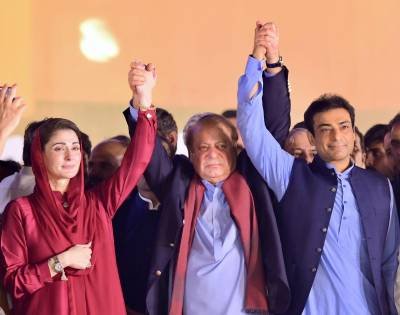Mubashar Nadeem
One of the enduring tragedies of Pakistani democracy is not simply the persistent interference of unelected institutions, but the inconsistency of democratic parties themselves when it comes to upholding the very values they claim to champion. The Pakistan Muslim League-Nawaz (PML-N) offers a revealing case study in this regard—particularly when comparing the party’s tone and conduct in 2021 with that of 2025.
Back in 2021, the PML-N was in opposition and its media machinery—spokespersons, social media teams, and public campaigns—was brimming with slogans like “respect the vote” and “civilian supremacy.” The narrative centered around democratic principles, the sanctity of the Constitution, and the rejection of military or bureaucratic interference in political affairs. This posture gave the impression of a party driven by ideology and committed to systemic reform. The demand was clear: let elected representatives govern without manipulation from unelected power centers.
Fast forward to 2025, and the script appears to have been flipped. As electoral winds began to shift in the PML-N’s favor and the possibility of returning to power became tangible, the same media teams and spokespersons who once denounced authoritarian overreach began rationalizing the very same undemocratic tactics they had once so fiercely opposed. The party’s tone has moved from confrontation to justification, and from principle to expediency.
This dramatic shift exposes more than a political pivot—it reveals a fundamental weakness in the ideological spine of mainstream political parties in Pakistan. In PML-N’s case, it demonstrates that the commitment to democracy and constitutionalism can be worryingly shallow, subordinated to the imperatives of political advantage.
What we are witnessing is not merely a change in messaging—it is a betrayal of a political philosophy. In the absence of power, the party championed constitutional order; in the pursuit of power, it now accommodates actions that undermine that very order. This isn’t just political opportunism; it’s a signal to the electorate that principles in Pakistani politics are, more often than not, negotiable.
This pattern also raises critical concerns about the nature of political activism and party membership in Pakistan. If workers and supporters are trained to rally behind slogans that change with the season, what kind of political culture can emerge? In such an environment, it is difficult—if not impossible—for genuinely ideological political workers to take root. Instead, we see the rise of campaigners who follow whatever narrative the leadership assigns, even if it contradicts yesterday’s gospel.
A true democratic tradition is founded on consistency—on defending constitutional values whether in power or out of it. But when parties like PML-N shift gears depending on their proximity to power, the entire democratic culture suffers. It breeds cynicism among citizens, weakens institutional trust, and reinforces the notion that politics is nothing more than a game of self-interest.
The PML-N’s dramatic transformation between 2021 and 2025 should not merely be dismissed as political strategy. It demands reflection—by the party itself, its supporters, and the broader public. In 2021, the party stood for the independence of civilian authority, electoral integrity, and a clear separation of powers. By 2025, those same ideals appear negotiable.
Even more troubling is the lack of introspection or internal accountability. There has been little to no public debate within the party about this ideological drift. The silence of senior leadership, the compliance of workers, and the normalization of double standards all point to a deeper problem: Pakistani politics does not nurture principled dissent—it rewards loyalty to personalities, not to ideas.
To reverse this decline, political parties must cultivate ideological integrity. That means adhering to democratic norms not only when it is politically convenient, but especially when it is not. Upholding constitutional values should not be a seasonal campaign—it should be the backbone of political identity.
If the PML-N—or any political party—wishes to be seen as a legitimate custodian of democratic ideals, it must ensure its actions are guided by principles, not circumstances. Only then can political discourse mature and democratic norms solidify.
The ideological dissonance between PML-N’s 2021 and 2025 behavior is not just a footnote in political strategy—it is a critical reflection of how easily values are traded for votes. It forces us to ask: Are Pakistani political parties committed to democracy as a moral conviction or merely as a tactic to reclaim office?
Until we see a sincere and consistent commitment to democratic norms—regardless of electoral fortunes—politics in Pakistan will remain a theatre of opportunism rather than a platform for principled governance.
















